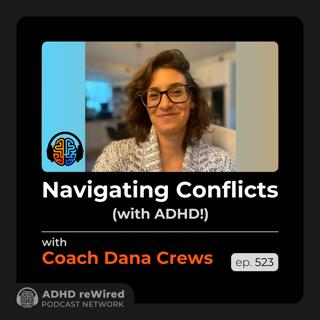Jaksokuvaus
This week, ADHD reWired welcomes Coach Dana Crews back on the podcast! In this episode, Eric and Dana have a vulnerable and open conversation about navigating conflict, the difference between conflict and disagreements, recognizing emotions, and making space for people we love but may also–at times–disagree with! Find more from Dana: All about Dana at www.adhdrewired.com/coach-dana-crews Second Arrow ADHD Coaching at secondarrowadhdcoaching.com ADHD reWired Episode 498: Will I Ever Be Content? In this episode, you’ll hear discussions and tips about: Is conflict inevitable? What concepts come with conflict? / Thinking about the differences between conflict, disagreements, and avoiding conflict How can we disagree without the intense emotional state that causes more dysregulation? Differences between professional, personal, and family conflicts / Difficulties of transitions and the true size of ‘problems’ Behaviors based on patterns and experiences even though we’re not living in those moments and being stuck living in the past “We don’t have to agree with a person’s perspective.” / It’s not WHAT we’re disagreeing about – it’s about HOW we’re disagreeing. The importance of acknowledging the other person’s feelings / Can I make space? Can I have empathy or compassion for the other person? Holding space also includes active listening and being present / Mindfulness and grounding to be in the present Stating intent: What is the goal? Is the goal to be heard? To be right? To be understood? To come to a resolution? A compromise? (The three Hs: Do you need to be heard, hugged, or helped?) Getting to a place of collaboration, connection, and trust; a lack of conflict isn’t necessarily healthy The power of the pause, non-judgmental awareness, and recognizing one’s own tendencies and patterns of behaviors Starting arguments as a way to stimulate the brain / Feeling understood and also feeling heard can also be stimulating Getting stimulus sustainably and healthfully without it being stressful, unhealthy, or a detriment to ourselves or our loved ones Setting boundaries and laying down expectations when needing to take a break to calm down from a conflict / How to come back after taking care of in-the-moment emotions Possibilities of creative problem solving / Acknowledging one’s role in a conflict without blaming Stepping out of the content of a conflict and separating the emotion from the story you’re telling yourself Identifying and tuning into emotions / “The story I’m telling myself is…” / Avoiding shame & guilt spirals Leaning into emotion vs. pushing away emotion Resources & Honorable Mentions App: How We Feel at howwefeel.org Article :: Turn Towards Instead of Away at gottman.com Article :: Crucial Conversations Skill Summary Book :: Nonviolent Communication by Marshall B. Rosenberg Book :: Rising Strong - Brene Brown Website :: The Center of Nonviolent Communication at Information :: Esther Perel: Understanding and Resolving Conflict How to Resolve Conflict (Esther Perel) Masterclass Information :: Paul Ekman - Emotions Revealed 🌟 Interested in group coaching and want to take your ADHD management to the next level? Go to coachingrewired.com to get all the up-to-date information on how to join our award-winning online coaching and accountability groups! 🌟 Interested in 1-on-1 coaching? Learn more and get in touch with Dana Crews at www.adhdrewired.com/coach-dana-crews 🌟 Check out the newest podcast on the ADHD reWired Podcast Network :: The ADHD Creatives Podcast with Kristin Marts, LCSW @ theadhdcreativespodcast.com 🎙️ 🎧

